 One of the most fun, yet unpredictable, subcategories within the vast pantheon of Supporting Actress nominations are those for "bad girls" -- those awful, incorrigible, sometimes demonic young girls and women who are especially astute at ruining the lives of others. Bonita Granville was nominated for just such a role in the category's first year and, perhaps as a result, I tend to think that Oscar has a sentimental weakness for such "mean girls." Such a predisposition might help explain the otherwise confounding nomination for...
One of the most fun, yet unpredictable, subcategories within the vast pantheon of Supporting Actress nominations are those for "bad girls" -- those awful, incorrigible, sometimes demonic young girls and women who are especially astute at ruining the lives of others. Bonita Granville was nominated for just such a role in the category's first year and, perhaps as a result, I tend to think that Oscar has a sentimental weakness for such "mean girls." Such a predisposition might help explain the otherwise confounding nomination for...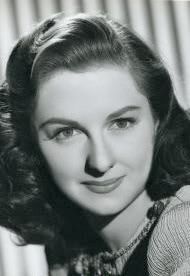

...Joan Lorring in The Corn Is Green (1945)
approximately 19 minutes and 59 seconds
10 scenes
roughly 17% of film's total running time
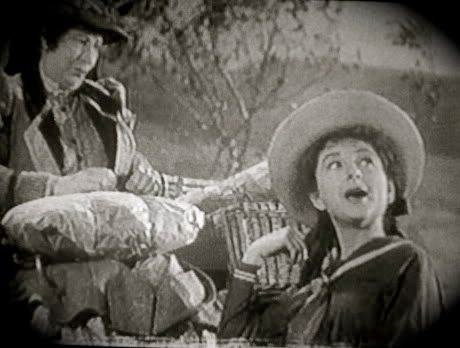 Worst of all, perhaps, Lorring's Bessie especially hates to find herself under the watchful, authoritative gaze of Miss Lily Moffat (Bette Davis, fine but unremarkable in the role), a dedicated spinster schoolteacher who happens also to Bessie's mother's employer.
Worst of all, perhaps, Lorring's Bessie especially hates to find herself under the watchful, authoritative gaze of Miss Lily Moffat (Bette Davis, fine but unremarkable in the role), a dedicated spinster schoolteacher who happens also to Bessie's mother's employer.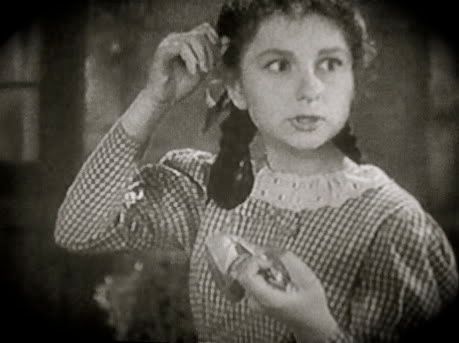 Lorring's first scenes easily establish that Bessie's an incorrigible, nasty little girl who blames Davis's Miss Moffat for all her troubles. Her subsequent scenes build upon this foundation to develop a character who's single-minded goal is to ruin Miss Moffat's happiness.
Lorring's first scenes easily establish that Bessie's an incorrigible, nasty little girl who blames Davis's Miss Moffat for all her troubles. Her subsequent scenes build upon this foundation to develop a character who's single-minded goal is to ruin Miss Moffat's happiness.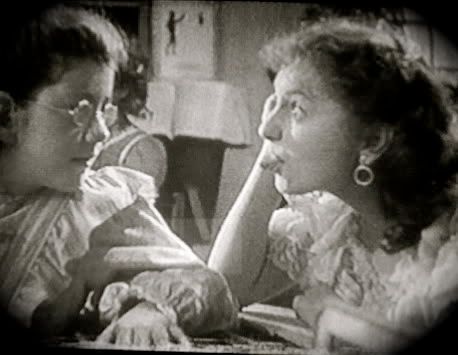 The film details only three or so years in the lives of its characters. And Lorring's Bessie marks the passage of each year with a radical transformation. She is a tiresome little brat in the first year; an adolescent, tantrum-prone twit in the pivotal second year; and, finally, a dangerously vengeful young woman in the narrative's third, concluding year.
The film details only three or so years in the lives of its characters. And Lorring's Bessie marks the passage of each year with a radical transformation. She is a tiresome little brat in the first year; an adolescent, tantrum-prone twit in the pivotal second year; and, finally, a dangerously vengeful young woman in the narrative's third, concluding year.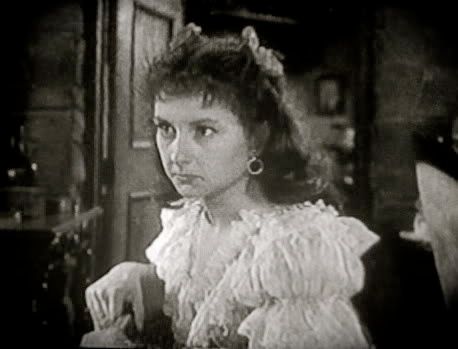 At each stage of the character's im/maturity, Lorring's Bessie is presented mostly for comic effect, her grandiose antagonism of Davis's Moffat dismissed by the characters around her. I'm not sure that the surrounding characters underestimate Lorring's Bessie; rather, they treat her as they might a rash -- an annoying, recurring inflammation easily cooled by a quick splash of humiliating punishment.
At each stage of the character's im/maturity, Lorring's Bessie is presented mostly for comic effect, her grandiose antagonism of Davis's Moffat dismissed by the characters around her. I'm not sure that the surrounding characters underestimate Lorring's Bessie; rather, they treat her as they might a rash -- an annoying, recurring inflammation easily cooled by a quick splash of humiliating punishment.Of course, Lorring's Bessie -- as a bored, petty, manipulative, vengeful and manipulative adolescent girl entering womanhood -- proves to be a potently dangerous nuisance. (Certainly, none of the girl's prim caregivers expect her to sneak out of the house and seduce Moffat's prize pupil.)
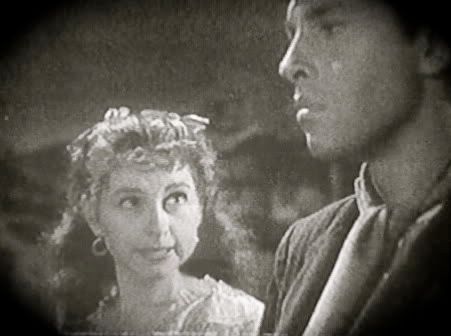 But seduce him she does, returning several months later to announce the impending arrival of "a little stranger."
But seduce him she does, returning several months later to announce the impending arrival of "a little stranger."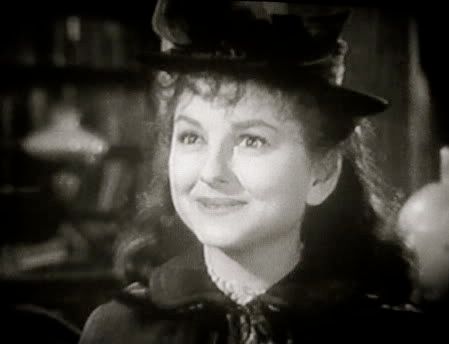 Davis's Moffat, mortified that her pupil's promising pupil's future has been jeopardized by this insufferable girl, assents to a kind of blackmail, in which Moffat provides the cash (and a few fibs about the boy) in exchange for Bessie keeping her distance.
Davis's Moffat, mortified that her pupil's promising pupil's future has been jeopardized by this insufferable girl, assents to a kind of blackmail, in which Moffat provides the cash (and a few fibs about the boy) in exchange for Bessie keeping her distance.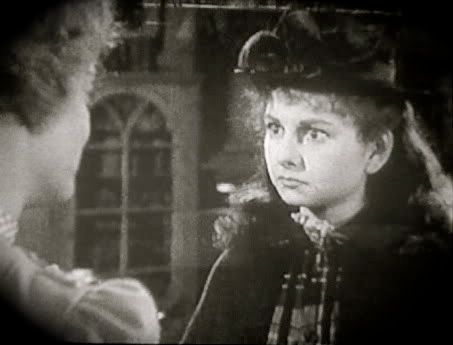 The charade works for a while but inevitably threatens to collapse as news of the boy's acceptance to Oxford spreads at precisely the same moment Lorring's Bessie returns to collect her "due."
The charade works for a while but inevitably threatens to collapse as news of the boy's acceptance to Oxford spreads at precisely the same moment Lorring's Bessie returns to collect her "due."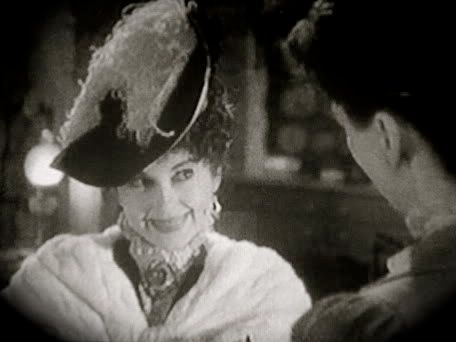 Lorring delivers Bessie's ultimatums with an "I'll show them!" alacrity that makes a lot of sense. She's here to gloat, to punish everyone for their great mistake of dismissing her. And as the town's pride in the boy's accomplishments rise, so too does Bessie's sense of her own power. Lorring has a grand time strutting and preening as Bessie in this scene, the pettiness of her cruelty a blithe afterthought (consider the devastation of Mildred Dunnock's Miss Ronberry when learning of Bessie's casual willingness to give away the child).
Lorring delivers Bessie's ultimatums with an "I'll show them!" alacrity that makes a lot of sense. She's here to gloat, to punish everyone for their great mistake of dismissing her. And as the town's pride in the boy's accomplishments rise, so too does Bessie's sense of her own power. Lorring has a grand time strutting and preening as Bessie in this scene, the pettiness of her cruelty a blithe afterthought (consider the devastation of Mildred Dunnock's Miss Ronberry when learning of Bessie's casual willingness to give away the child).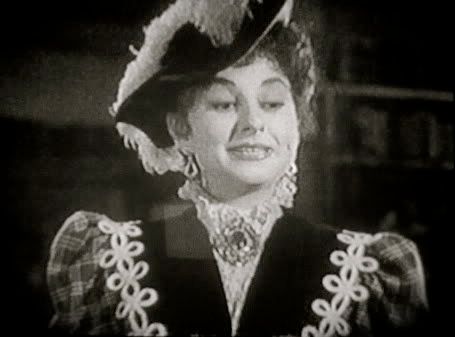 But it's not until the final moments, when all the dealmaking has been done, that Lorring has the opportunity to convey the truth within Bessie's cynical manipulations.
But it's not until the final moments, when all the dealmaking has been done, that Lorring has the opportunity to convey the truth within Bessie's cynical manipulations.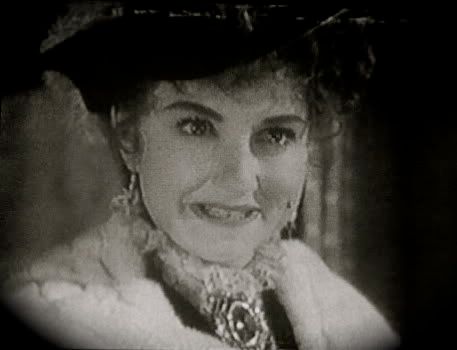 Bessie simply hates Miss Moffat, and is doing everything she can to punish the schoolteacher for being so cruel to her. It's a startling moment, when Lorring lets the frippery of her characterization to slide away to reveal a genuine shock of emotion. Although Lorring's Bessie is curiously cowed by the formidable implacability of Davis's Moffat, the moment is fun while it lasts.
Bessie simply hates Miss Moffat, and is doing everything she can to punish the schoolteacher for being so cruel to her. It's a startling moment, when Lorring lets the frippery of her characterization to slide away to reveal a genuine shock of emotion. Although Lorring's Bessie is curiously cowed by the formidable implacability of Davis's Moffat, the moment is fun while it lasts.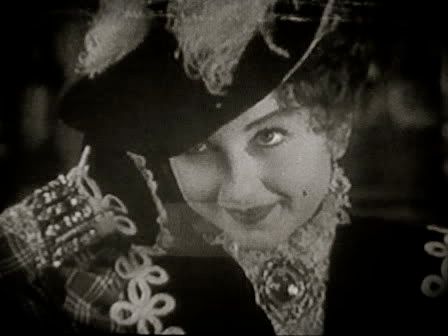 All told, Lorring's performance as Bessie is just fine. True: Lorring's accent is garbled, muffling the impact some of Bessie's more amusing asides. (I especially liked Bessie's comparative assessment of fake versus real jewels.) Yes: Lorring provides the "3 faces of Bessie" without much (beyond mugging and the aforementioned garbled accent work) contuinity to link the three glimpses of the character. Certainly: I'd have rather seen a Lansbury or a Granville in the role, but Lorring more than holds her own opposite LaDavis. Absolutely: there's not a lot of nuance. (But, hey, The Corn Is Green is, ostensibly, a comedy; it's also, unmistakably, a Bette Davis vehicle. Perhaps as a result, the piece's overall "style" and "tone" are as inconsistent as the array of putatively British accents.)
All told, Lorring's performance as Bessie is just fine. True: Lorring's accent is garbled, muffling the impact some of Bessie's more amusing asides. (I especially liked Bessie's comparative assessment of fake versus real jewels.) Yes: Lorring provides the "3 faces of Bessie" without much (beyond mugging and the aforementioned garbled accent work) contuinity to link the three glimpses of the character. Certainly: I'd have rather seen a Lansbury or a Granville in the role, but Lorring more than holds her own opposite LaDavis. Absolutely: there's not a lot of nuance. (But, hey, The Corn Is Green is, ostensibly, a comedy; it's also, unmistakably, a Bette Davis vehicle. Perhaps as a result, the piece's overall "style" and "tone" are as inconsistent as the array of putatively British accents.)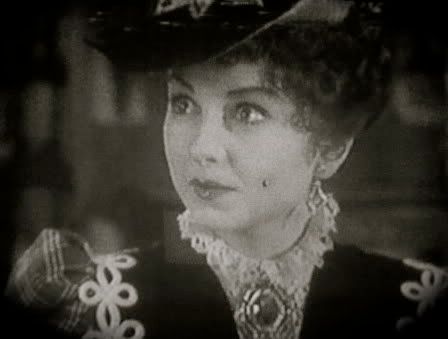 True. Yes. Certainly. Absolutely. Yet, all that being said, Lorring's performance provides a diverting goose of energy in this generally turgid ode to the humble heroism of dedicated teachers everywhere. I don't know that I could have survived the film without Joan Lorring's energetic performance of the bad girl, bad seed Bessie.
True. Yes. Certainly. Absolutely. Yet, all that being said, Lorring's performance provides a diverting goose of energy in this generally turgid ode to the humble heroism of dedicated teachers everywhere. I don't know that I could have survived the film without Joan Lorring's energetic performance of the bad girl, bad seed Bessie.

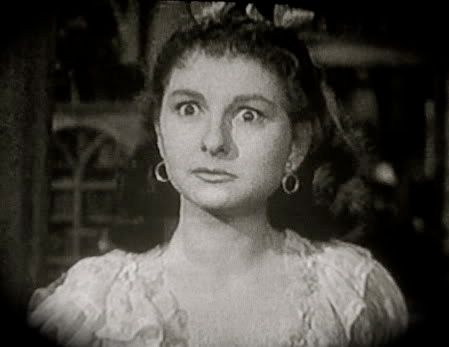
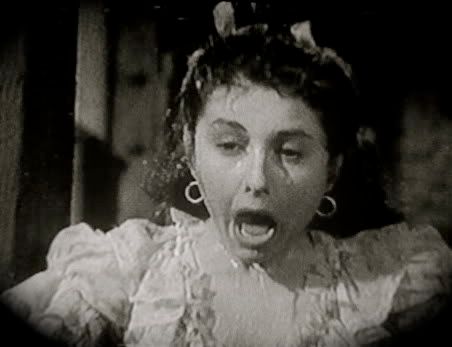
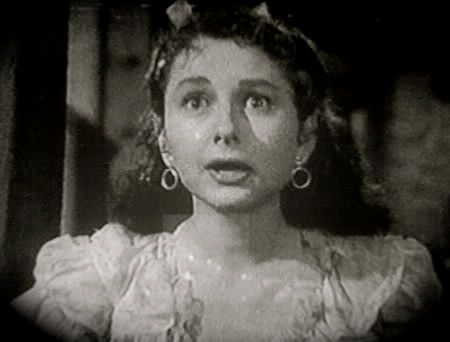
2 comments:
geostI'm interested in seeing it. I see that Dunnock was in the play on Broadway, and I wonder if that contributed to her perf?
This is by far my least favorite Bette Davis film. It's tedious and sentimental, although I do enjoy the scenes between Davis and Nigel Bruce. There are just too many over the top characters in the film, though, and none of them funny in the least.
Post a Comment